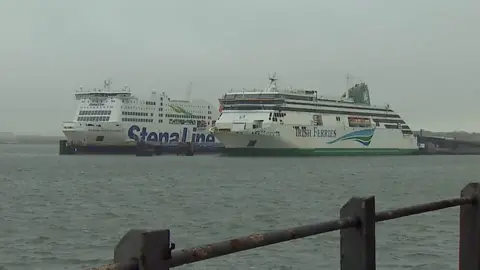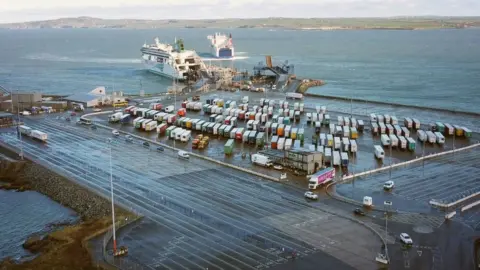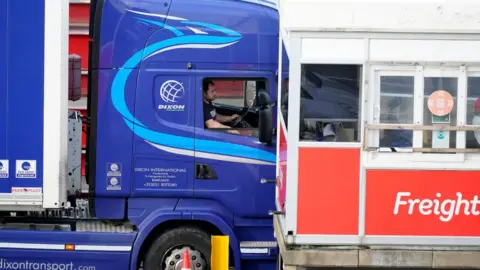Brexit: Stena Line 'committed to Wales' despite traffic drop
 BBC
BBCStena Line has said it remains committed to its ports and ferry routes serving Wales despite a drop in traffic due to Brexit and Covid-19.
Since 1 January, drivers have had to provide specific paperwork to take goods between the EU and the UK.
The number of lorries using ferries between Holyhead and Dublin, and Fishguard and Rosslare, has dropped by 50% since the start of 2021.
Stena Line said it was a "blip" and it would work hard to protect the routes.
The Welsh Government and a number of MPs have expressed concern at the drop in traffic through Welsh ferry ports as hauliers avoid queues.
Stena Line, which owns Holyhead Port, said traffic between Britain and Northern Ireland had already returned to normal levels and freight volumes between Ireland and France had risen considerably.
Ian Hampton, executive director of Stena Line UK, said the company was also dealing with a fall in passenger numbers due to coronavirus restrictions on both sides of the Irish Sea.
He said: "This is a blip on the horizon in the general life cycle of Stena Line.
"We've been in existence for a long, long time. We have the financial resources to weather the storm.
"We know that the business model in the Irish Sea is a strong model and it is one that we will work hard to protect."
Mr Hampton added: "We're a hundred percent committed to our operation in the Irish Sea, to our Stena Line vessels and also to the ports that we own."
 AFP
AFPMr Hampton said that if it got to summer 2021 and freight traffic at the ports had not increased he would be "concerned".
"That is something we will monitor carefully, but with the Covid lockdown as well, it's a very hard point to put your finger on," he said.
For decades, trucks from mainland Europe heading for Ireland have used the UK as a "land bridge", often picking up loads on the way back.
Holyhead, Fishguard and Pembroke Dock have all benefited from this traffic.
But there are concerns disruption at ports has made many hauliers drive to northern France and across the Irish Sea to Ireland, bypassing the Welsh ports.
By using the longer and more expensive sea route, lorries remain in the EU and do not have to go through customs.
Demand is so high ferry companies have increased sailings and routes, including Stena Line - 18 months ago there were three sailings a week between Rosslare and France and Spain, now there are 15.
 Getty Images
Getty ImagesMr Hampton said he doubted the direct crossings between Ireland and France would completely replace traffic through Holyhead and Fishguard, as the routes were longer and more expensive.
"From hauliers' point of view, the drivers are tied up for the best part of 24 hours at sea," he said.
"The UK land bridge is cheaper and quicker, and will always have more capacity. Even with extra ships operating between Rosslare and Cherbourg, there's only about 15% of the space there is between Dublin and Holyhead."
